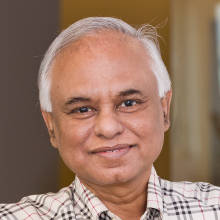Bridging the language barrier in India’s digital space
Only 4% of India's population is fluent in English. This is the segment that reaps the rewards of India’s education system and corners job opportunities. And even though we are more than 1 billion people, less than 0.01% of the content on the internet is in Indian languages, says Arvind Pani, chief executive and co-founder of Reverie Language Technologies.
His brother and co-founder Vivekanand, who is also the chief technology officer, adds, “While digital devices and the internet are reaching more and more people, content and services are not available in Indian languages.”
This is the language gap that the company, founded in 2009, has been working to fill. Qualcomm Ventures and Aspada Investment Advisors have invested in the company. Its language applications that enable farmers to check commodity prices, and that help drivers using apps for taxi bookings, have seen wide success.
Arvind reckons, internet in India is sitting on a $30-billion-plus opportunity, but we can’t get there by just focusing on English language content.
Vivekanand draws a parallel with China: “In India, we are able to start a business targeting English users alone. Though that is just 4-5% of the population, in absolute numbers, it is a large population. In China, that option wasn’t there. And because of that, a lot of things have happened very differently. The e-commerce world or the digital world is entirely in Chinese. There is no English and non-English divide. ...Knowledge and information is available in Chinese, therefore grassroots innovation happens. The amount of services that are available is phenomenal.”
E-commerce and the challenges in adoption
Are there mental barriers they face when pitching their products, especially to the big ecommerce players?
They say, the internet companies “understand India—that 4%—but not Bharat”. They don’t understand what it will take to get these users online. Even if they are trying to tap Indian language users, the expectation is that this is a growth hack—that by providing a language option users will come in hoards. They forget that they had to create awareness even to acquire English language users.
Another challenge is that most Indian language internet users are getting introduced to the smartphone as well as the internet for the first time. It is unfair to expect that they will be as mature as the English language users who have been using internet for 15-20 years and have migrated from the PC to the mobile phone. So, that level of understanding and patience to invest for the future is imperative.
The investor-entrepreneur relationship
Back in 2011, Arvind and Vivekanand made a deliberate decision to not get an investor even though they had a “just a three-four month runway left”.
“We hadn't figured out what our product was, our business model, who would be our set of customers? Trying to find those answers with investors' money was not a wise option…. We deliberately decided to bootstrap the company to a certain stage where we demonstrate enough skin in the game ourselves… where we know what kind of problems money can solve before we raise funds.”
What to look for in a co-founder
It is very natural to look for a co-founder with whom you have a history of getting along well. Avoid that. Instead look for someone with whom you can openly share differences and where you have a history of resolving conflicts objectively.
And how do you create a brand for an “invisible” product? Their answer: "Build value, not valuation."

Chandrashekar Rao Kuthyar on Jun 05, 2017 2:42 p.m. said
<CS> Good interview. The last quote was impressive - "Build something for value, not valuation". The founders are aware that they have so much more to do, before beating the drums. This was evident when the interviewer asked them about branding like "Intel Inside". Suggested viewing for all final year engineering students </CS>